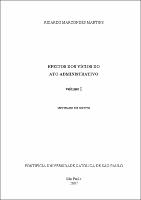Use este identificador para citar ou linkar para este item:
https://repositorio.pucsp.br/jspui/handle/handle/7379| Tipo: | Dissertação |
| Título: | Efeitos dos vícios do ato administrativo |
| Autor(es): | Martins, Ricardo Marcondes |
| Primeiro Orientador: | Mello, Celso Antonio Bandeira de |
| Resumo: | Este estudo tem por objeto a compreensão dos efeitos dos vícios do ato administrativo. O conceito de princípio jurídico foi se modificando ao longo dos anos: cada vez mais cresce sua importância na Ciência do Direito, novos efeitos lhe são atribuídos. Por isso, a retomada de temas já explorados, não dotados de recentidade, é justificada pelos substanciais reflexos da evolução conceitual do princípio jurídico. Esse, justamente, é o ponto de partida desta exposição: o sistema normativo é formado por regras e por princípios, ambos são normas jurídicas autônomas. Procurou-se extrair todas as conseqüências jurídicas da autonomia normativa dos princípios e a partir delas rever os conceitos de função administrativa, de ato administrativo, dos vícios deste e, finalmente, dos efeitos desses vícios. Trata-se de estudo dogmático, voltado para identificação das normas jurídicas vigentes no sistema jurídico brasileiro. Empreendeu-se, assim, a análise dos textos normativos e doutrinários relacionados ao tema. A função administrativa é exercida mediante a edição do ato administrativo, denominação dada a todo veículo introdutor de norma administrativa. O ato administrativo deve sempre concretizar o princípio mais pesado no caso concreto pelo meio exigido pelo sistema jurídico. Ele será viciado quando houver deficiência de um dos seis pressupostos de regularidade: subjetivo, objetivo, teleológico, material, lógico e formalístico. Identificaram-se quatro efeitos dos vícios do ato administrativo: o dever de corrigir o vício, o direito de resistência passiva, o dever de reparar os danos causados e o dever de responsabilizar o agente. O estudo revelou a importância da ponderação das circunstâncias fáticas e jurídicas tanto para a identificação como para a caracterização desses efeitos. A função administrativa, eis a conclusão principal da exposição, não é exercida apenas pela subsunção, mas, sobretudo, pela ponderação |
| Abstract: | This study is aimed at analyzing the effects produced by the defects in the administrative act. The concept of legal principle has changed over the years: now it becomes increasingly important to the Science of Law, being endowed with new implications. For this reason, the resumption of matters already explored, and which are not recent, is explained by the substantial consequences brought by the conceptual evolution of legal principle, which is precisely the starting point of this exposition: the normative system is made up of rules and principles, both of which are autonomous legal norms. One sought to extract all of the legal consequences resulting from the normative autonomy of the principles, and from such consequences rethink those concepts of administrative function, administrative act, administrative defects, and finally, the effects resulting from said defects. This concerns a dogmatic study, driven towards the identification of the legal norms prevailing in the Brazilian legal system. One has, therefore, undertaken an analysis of the normative and academic texts related to the theme. The administrative function is exercised through the issuing of the administrative act, a name given to every vehicle that brings a new administrative norm into the legal system. The administrative act must always apply the heaviest principle to a case under scrutiny in a court of law according to the means required by the legal system. It will be defective when one, out of the six requirements of compliance, to wit, subjective, objective, causal, material, logic and formalistic, proves to be faulty. Four effects resulting from the defects of the administrative act have been identified: the duty to cause the defect to be cured, the right to a passive resistance, the duty to compensate for the damages caused, and the duty to hold its agent liable. The study revealed the relevance of pondering the factual and legal circumstances both for the identification of the effects and for them to be characterized. The administrative function, hence the main conclusion hereof, is not exercised only by fitting the facts to the law, but above all, by weighing the rules and principles, considering their respective factual circumstances |
| Palavras-chave: | Vícios do ato administrativo Defects in the administrative act Atos administrativos -- Brasil |
| CNPq: | CNPQ::CIENCIAS SOCIAIS APLICADAS::DIREITO |
| Idioma: | por |
| País: | BR |
| Editor: | Pontifícia Universidade Católica de São Paulo |
| Sigla da Instituição: | PUC-SP |
| metadata.dc.publisher.department: | Faculdade de Direito |
| metadata.dc.publisher.program: | Programa de Estudos Pós-Graduados em Direito |
| Citação: | Martins, Ricardo Marcondes. Efeitos dos vícios do ato administrativo. 2007. 641 f. Dissertação (Mestrado em Direito) - Pontifícia Universidade Católica de São Paulo, São Paulo, 2007. |
| Tipo de Acesso: | Acesso Restrito |
| URI: | https://tede2.pucsp.br/handle/handle/7379 |
| Data do documento: | 2-Mar-2007 |
| Aparece nas coleções: | Programa de Pós-Graduação em Direito |
Arquivos associados a este item:
| Arquivo | Descrição | Tamanho | Formato | |
|---|---|---|---|---|
| Ricardo Marcondes Martins.pdf Restricted Access | 5,11 MB | Adobe PDF |  Visualizar/Abrir |
Os itens no repositório estão protegidos por copyright, com todos os direitos reservados, salvo quando é indicado o contrário.
